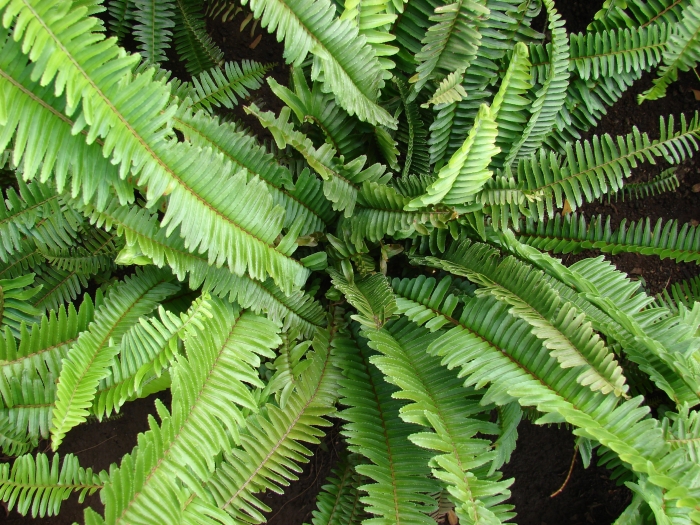Sword Fern
(Nephrolepis cordifolia)
Sword Fern (Nephrolepis cordifolia)
/
/

Forest & Kim Starr
CC BY 3.0
Image By:
Forest & Kim Starr
Recorded By:
Copyright:
CC BY 3.0
Copyright Notice:
Photo by: Forest & Kim Starr | License Type: CC BY 3.0 | License URL: https://creativecommons.org/licenses/by/3.0 | Uploader: BotMultichillT | Publisher: Wikimedia Commons | Title: Starr_070221-4863_Nephrolepis_cordifolia.jpg | Notes: From en wiki Source from [http://www.usda.gov/oc/photo/96vs2177.htm], {{PD-USGov-USDA}} |





















































Estimated Native Range
Summary
Nephrolepis cordifolia, commonly known as the Sword Fern or Fishbone Fern, is a perennial, evergreen fern native to a variety of habitats including moist, shaded forests, swampy areas, and open woodlands in tropical regions of South and East Asia, northeastern Australia, and the Pacific, including the Solomon Islands and Hawaii. It is known for its dense clusters of long, arching fronds that can reach up to 3 feet in length, giving it a lush, feathery appearance. The fronds are bright green, with a distinctive herringbone pattern that contributes to its common names. This fern produces small, round tubers on its roots, which help it survive periods of drought.
Sword Fern is valued for its hardiness and adaptability, making it a popular choice for indoor and outdoor cultivation. It thrives in a range of light conditions, from full sun to full shade, and prefers consistently moist soil with good drainage. It is often used as a ground cover or in hanging baskets due to its attractive foliage and ease of maintenance. However, its ability to spread via spores and tubers can make it invasive in some regions. In areas where it is not invasive, it can provide excellent erosion control on slopes and is used in restoration projects.CC BY-SA 4.0
Sword Fern is valued for its hardiness and adaptability, making it a popular choice for indoor and outdoor cultivation. It thrives in a range of light conditions, from full sun to full shade, and prefers consistently moist soil with good drainage. It is often used as a ground cover or in hanging baskets due to its attractive foliage and ease of maintenance. However, its ability to spread via spores and tubers can make it invasive in some regions. In areas where it is not invasive, it can provide excellent erosion control on slopes and is used in restoration projects.CC BY-SA 4.0
Plant Description
- Plant Type: Fern
- Height: 2-3 feet
- Width: 2-3 feet
- Growth Rate: Moderate
- Flower Color: N/A
- Flowering Season: Non-Flowering
- Leaf Retention: Evergreen
Growth Requirements
- Sun: Full Sun, Part Shade, Full Shade
- Water: Medium
- Drainage: Medium
Common Uses
Border Plant, Groundcover, Low Maintenance, Street Planting
Natural Habitat
Moist, shaded forests, swampy areas, and open woodlands in tropical regions
Other Names
Common Names: Boston Fern , Sword Fern , Tuber Ladder Fern , Fjäderbräken , 줄고사리 , 腎蕨 , Erect Sword Fern , Fish-Bone Fern , Herring Bone Fern , Ladder Fern
Scientific Names: Nephrolepis cordifolia , Nephrolepis auriculata , Polystichum auriculatum , Nephrolepis tuberosa , Polypodium auriculatum , Aspidium tuberosum , Aspidium sublanosum , Aspidium imbricatum , Nephrolepis imbricata , Aspidium cordifolium
GBIF Accepted Name: Nephrolepis cordifolia (L.) C.Presl